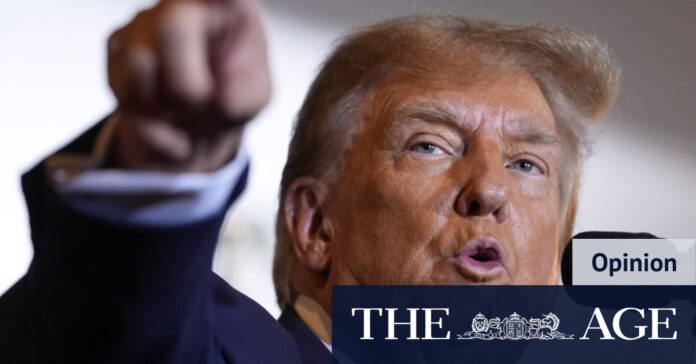[ad_1]
Loading
Horrific though the consequences are for besieged Ukrainians, markets take comfort from the way events have played out. Putin is considered very unlikely to also take a tilt at the NATO-guaranteed Baltics, and despite the cost-of-living crisis, the wider economic impact has been smaller than feared.
Yet politicians are taking no chances and almost everywhere rearmament has become a top priority. The trouble is that countries don’t tend to rearm unless they think there is at least some chance they might have to use those weapons. Nearly all wars begin with rearmament.
Adding further to the sense of global insecurity over the last week is the repudiation by North Korea’s Kim Jong Un of his peaceful reunification policy, a move which rightly or wrongly is seen as preparing the country for renewed war with the South and other regional “enemies”.
In any case, there is an almost total disconnect between market and political narratives when it comes to today’s mounting geopolitical tensions.
As far as I can tell, there is no attempt whatsoever by investors to discount what the politicians increasingly frame as a clear and present danger, even by way of what is known as “tail risk”.
If Mr Market thinks there is nothing to worry about, then perhaps there isn’t. Unfortunately, it doesn’t mean that markets are right.
Oil and gas prices have barely moved in response to the escalation of tensions in the Middle East, despite the region’s key position as a global producer.
This might seem faintly reassuring. If Mr Market thinks there is nothing to worry about, then perhaps there isn’t. Unfortunately, it doesn’t mean that markets are right.
Historically, investors have collectively tended to be particularly bad at predicting wars, if only because all wars are economically irrational, and it is therefore assumed that this will act as a natural deterrent to waging them.
In a highly influential book, The Great Illusion, published a few years before the outbreak of World War I, the British journalist Norman Angell argued compellingly that the presiding age of global trade and international integration had made the economic costs of war so great that nobody could possibly hope to gain by starting one – the “great illusion” being that nations could still benefit from conquest.
Poor Mr Angell. He has been unfairly represented ever since as arguing that war had become impossible because economic interdependence was a “guarantor of good behaviour by one state to another”. In fact, his argument was only that trade made war less likely.
In the event, it made no difference at all, yet markets continued to believe in the logic of Angell’s argument even beyond the point of mobilisation. It wasn’t until borders started to close, sparking a chain reaction of defaults and a consequent collapse in the banking system, that investors fully appreciated the peril they were in.
Angell’s way of thinking nonetheless continues to instruct current analysis. For instance, Germany allowed itself to become dependent on Russian gas not just because it was cheap, plentiful and convenient, but because by economically embracing the Russian bear it hoped to tame it. Again, it made no difference.
Similarly with China, whose integration into the global economy has proved worthless as a guarantor of friendly relations. As tensions rise, Western economies are scrambling to disengage from complex international supply chains and make themselves more self-reliant.
Investors do admittedly wholly take on board the likely stagflationary consequences of this process of “de-risking”; it’s going to make goods and services more expensive and thereby crimp consumption.
Even so, markets don’t collectively seem to have thought through the wider implications. Why bother with self-sufficiency unless you think war, or at least some kind of effective blockade, might be coming down the line at you?
Few would ever welcome any war, but just occasionally military conflict does have positive economic consequences, despite the destruction it inevitably visits.
For instance, there is little doubt that, as an economy, the US benefited significantly from World War II, finally ridding itself of the scourge of the Great Depression and establishing the country as the world’s dominant superpower and technological innovator.
Loading
Angell is therefore not entirely right to argue that nobody profits from war. The key difference here, however, is that the US was not the aggressor; its ascendancy was a byproduct of Japanese and German overreach.
It’s also true that all Western economies, including Germany’s, grew much richer on the rebirth that eventually occurred after the war had ended.
But try telling that to the afflicted during the mayhem of the immediate conflict, when the idea that in the long run everything will be fine again would be regarded as positively insulting.
There is of course a sense in which there is no point in worrying about possible but not yet baked-in events. In a third world war, all bets would be off the table, and finance would change beyond recognition. Any such catastrophe cannot be priced in.
The current complacency is nonetheless an oddity which seems to stand an ever-higher chance of breaking asunder on the rocks of harsh realities.
The Telegraph, London
The Business Briefing newsletter delivers major stories, exclusive coverage and expert opinion. Sign up to get it every weekday morning.
[ad_2]
Source link



